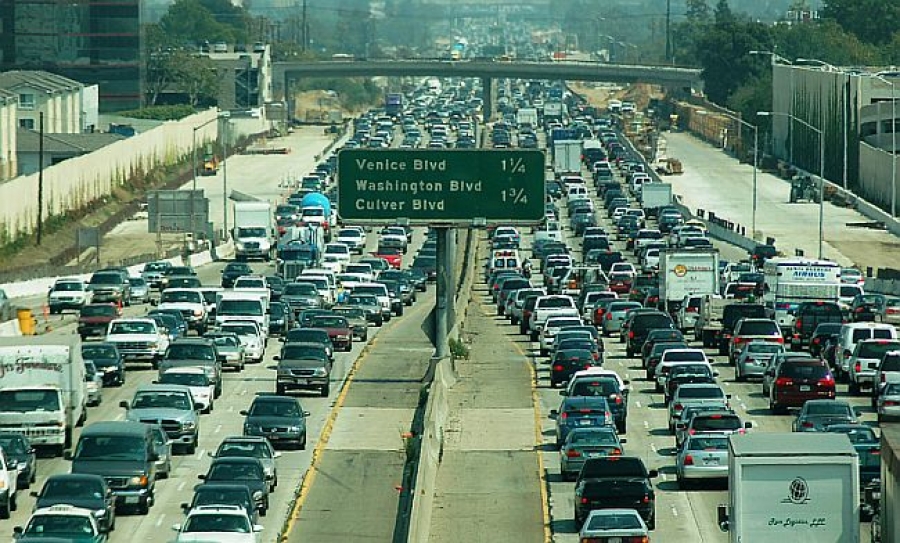Rising home prices send buyers further out of the city in search of an affordable home - or more home than they can swing closer to where they had rather be. It's an age-old tale and one that forces buyers to accept a cringe-worry tradeoff for a home of their own: a longer commute.
Currently, the average commute is around 26 minutes, but anyone in Los Angeles or New York or Dallas or Chicago or any one of the dozens of cities across the country with a lengthy commute would scoff at that number.
WNYC's cool commuter map allows you put your cursor on different cities and areas throughout the country and see its average commute time, like the 60.5-minute average in Sonoma County, CA and the 18.3-minute average for North Canaan, CT. Overflow Data's similar interactive map uses census data of the average commute times throughout the U.S. "Zoom in on a state, or check out the range within each state," said Lifehacker. "Commutes are worst along the East coast; L.A. traffic still isn't as bad as New York subways. And the worst commutes of all are in Pike County, PA, a three-hour drive from New York."
According to Census Bureau data, commutes have increased by 20 percent since they first started tracking them in 1980. The combination of continued urban sprawl and rising home prices will likely cause this number to jump even further over the next few years. The good news is that remote work and flexible schedules are also on the rise. "The number of telecommuting workers has increased 115% in a decade, according to a new report from Global Workplace Analytics and FlexJobs," said CNN: Money. "That translates to 3.9 million workers, or almost 3% of the total U.S. workforce, working from home at least half the time in 2015, an increase from 1.8 million in 2005." Negotiating some flexibility into your schedule or new job offer could reduce the number of days you have to drive to work and make a longer commute easier to deal with.
How much is too much?
The question of "How much commute is too much commute?" is one that each individual has to answer for themselves. Twenty minutes each way may not seem like a big deal, but what if it creeps past 30? And what if you're considering becoming a "super commuter," defined as someone who commutes three hours per day, like nearly four million American workers do? "That works out to more than a full month out of the year commuting," said the Washington Post. "Imagine spending the entire month of August - 24 hours of every day - stuck in your car or riding the bus."

Chances are you'll go through the five stages of grief - denial, anger, bargaining, depression, and, finally, acceptance when weighing the advantages of owning a home against the disadvantages of never being there. But the acceptance here can take two roads: In one, you realize you don't want to spend so much time in the car and ask your Realtor to start looking into areas that are closer in; the other requires you to resign yourself to this new reality of a daily date with a packed freeway, a grande mocha, and endless morning radio shtick.
The dangers of long commutes
Before you pull the trigger on a house with a 45-minute commute each way, there are a few things you'll want to ask yourself:
How much will this actually change your life? If you're buying a new home for your family but you never see them because you'll be leaving for work at the crack of dawn and getting home after the kids go to bed, is it worth it? The fact that townhomes are currently the "fastest-growing segment of the single-family housing construction market," according to the National Association of Home Builders, is important to note. "They made up about 12.4% of all new construction in the single-family home market last year, according to U.S. Census Bureau data," proving that many homebuyers are seeking out attached residences that are often well-located for their needs and more affordable than single-family homes in the city.
How much time can you really see yourself spending behind the wheel before you lose it? Are you able to zone out and enjoy the ride, or are we talking potential road rage situation?
Have you considered the added costs? More gas, tolls, and wear and tear on your car can add to your bottom line and chip away at the savings you thought you'd enjoy with a home out in the suburbs.
What about the cost to your mental health? It's not just about road rage. You may think you can adapt to anything, but commuting can be a serious buzzkill. "In happiness studies, commuting consistently ranks at or near the bottom of human activities," said Smartasset. "The biggest offender is commuting alone in a car. It makes us feel more isolated and powerless, and cuts into our time for community engagement, exercise and sleep." Nobel laureate Daniel Kahneman and economist Alan Krueger did a study with 900 Texas women and found that, "People hate their commutes more than just about any other activity in their lives," said the Washington Post. "The morning commute came in dead-last in terms of positive emotions, behind work, child care, and home chores." Higher rates of divorce and depression have also been linked to long commutes.
Have you thought about the effect on your body? Longer commutes have been linked to everything from high cholesterol, high blood pressure, and obesity to back and neck issues.
Smartasset's site has a useful resource for figuring out a potential commute. Just plug in your home and work address and see how good - or bad - it's going to be.
Source: Realty Times | Jaymi Naciri 013118


No comments:
Post a Comment